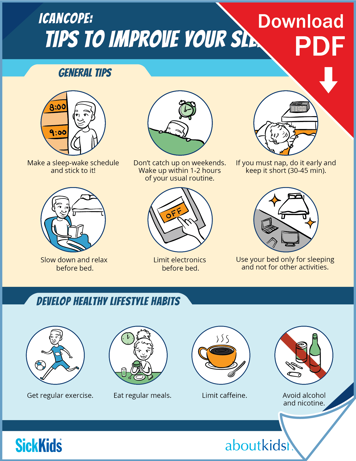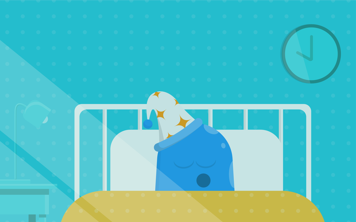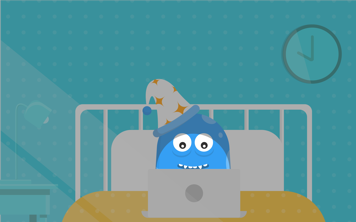There are seven sleep tips that you can learn to help you fall asleep and get the best sleep possible:

Tip 1: Follow a sleep schedule
Follow a schedule that allows you to wake up and go to bed at about the same time every day (even when there isn't school). If you share a room, try to make a quiet time or bedtime for everyone so you are not disturbed.
Our bodies like regularity. When you go to bed at regular times, your body gets into the habit of feeling sleepy at the time you usually get to bed. When you wake up at regular times, your body learns to be alert at the time you usually wake up.
Tip 2: Avoid weekend catch-ups
Stick with your regular bedtime and wake times even on weekends and during vacations. Do not use weekends and vacations to “catch up” on sleep. Keep your schedule so it doesn’t change by more than one or two hours from your normal bedtime and wake time. So, for instance, if you usually get up at 7 a.m. on school days, try not to sleep past 9 a.m. on weekends.
Tip 3: Limit naps
Try not to take naps during the day. If you are really sleepy or don't feel well and you need to nap, then limit it to 30 to 45 minutes in the early afternoon. Set an alarm or ask someone to wake you up so that you don't nap for too long. If you sleep for too long or too late in the afternoon, you will find it harder to fall asleep at your usual bedtime.
Tip 4: Develop healthy lifestyle habits

A number of lifestyle habits can help you feel comfortable and ready for sleep. These include getting regular exercise, avoiding caffeine and eating regular meals.
The American Academy of Pediatrics recommends that teens get no more than 100 mg of caffeine a day. Check the chart below to see the caffeine content in common drinks, sweets and medications.
Coffee
| Type of coffee | Milligrams of caffeine |
|---|---|
| Decaffeinated | 2 |
| Instant (8 fl oz.) | 57 |
| Espresso (1 fl oz.) | 77 |
| Brewed (8 fl oz.) | 108 |
| Starbucks, Short Brewed (8 fl oz.) | 180 |
| Starbucks, Tall Brewed (12 fl oz.) | 260 |
| Starbucks, Grande Brewed (16 fl oz.) | 330 |
| Starbucks Venti Brewed (20 fl oz.) | 415 |
Tea
| Type of tea | Milligrams of caffeine |
|---|---|
| Herbal | 0 |
| Decaf | 5 |
| Green | 25 |
| Instant | 26 |
| Arizona Iced (20 fl oz.) | 38 |
| Black | 42 |
| Lipton Iced (20 fl oz.) | 48 |
| Lipton (8 fl oz.) | 55 |
Selected soft drinks
| Brand (12 oz. serving) | Milligrams of caffeine |
|---|---|
| 7-UP | 0 |
| Sprite | 0 |
| A&W Root Beer | 0 |
| Barq’s Root Beer | 23 |
| Coca-Cola (Classic) | 34 |
| Pepsi Cola | 38 |
| Dr. Pepper | 41 |
| Coke Zero | 45 |
| Diet Coke | 45 |
| Mountain Dew | 54 |
Energy drinks
| Brand | Milligrams of caffeine |
|---|---|
| VitaminWater Energy Drink (11.5 fl oz.) | 80 |
| Red Bull (8.46 fl oz.) | 80 |
| Rockstar (16 fl oz.) | 160 |
| Monster (16 fl oz.) | 160 |
| NOS Energy Drink (16 fl oz.) | 160 |
| Crave Energy Drink (16 fl oz.) | 192 |
| 5 Hour Energy Shot (2 fl oz.) | 200 |
| Pure Kick Energy Drink (20 fl oz.) | 200 |
| 10 Hour Energy Shot (1.93 fl oz.) | 422 |
Chocolate
| Type of chocolate | Milligrams of caffeine |
|---|---|
| Dark chocolate (1 oz.) | 12 |
| Milk chocolate (1 cup, chips) | 34 |
Non-prescription medications (standard dose)
| Type of medication | Milligrams of caffeine |
|---|---|
| Some cold/allergy remedies | 27 |
| Some analgesic/pain relief tablets (check label) | 41 |
| Alertness tablets | 150 |
| Some diuretics | 167 |
| Weight control aids | 168 |
Another important healthy habit is to avoid alcohol and nicotine (cigarettes). There are many health reasons why teens should not smoke or drink alcohol. One of them is that alcohol and nicotine interfere with sleep. Alcohol can make you feel drowsy at first, but it can cause you to wake up later at night and then have trouble falling back asleep. Cigarettes and other tobacco products are stimulants (they are energizing). Like too much caffeine, they can make it hard to fall asleep.
Tip 5: Keep your bed for sleeping

Use your bed only for sleeping. Avoid studying, reading, watching television or drawing in bed. Too much time spent in bed doing other things can disrupt your brain and break your body’s association between being in bed and falling asleep quickly.
Find a chair or another place to sit to do non-sleeping activities. If you sleep on a couch or futon and there is no other place to do homework or watch TV, make sure that you stop these activities at bedtime. You can also ask your parents for help figuring out a place besides your bed where you can do homework.
Tip 6: Have a relaxing bedtime routine
Make a relaxing bedtime routine that you can follow each night. It should involve 20 to 30 minutes of quiet, wind-down activities like reading, looking at a magazine, listening to music or writing in a journal. Try not to continue doing homework until the minute you want to fall asleep. It is important for your body to relax and slow down enough to let you sleep properly!
Tip 7: Limit electronics

Limit the number of electronics in your bedroom or in the area of your home where you sleep. Having a television, gaming computer or cell phone turned on can all disrupt your bedtime. The bright lights and sounds are stimulating or energizing to your body and may disturb you after you fall asleep, for instance if you fall asleep with the television on or if you get a text message during the night.
It is not enough to just turn down the brightness of your screens. Electronics disrupt the winding down process and have a negative impact on healthy sleep. It is best to develop other calm activities to do at bedtime. If other people in your home are using electronics near you when you are trying to fall asleep, see if you can agree to set "quiet hours" after your bedtime.
If you charge your electronics overnight, do so in another room. A charging station outside your bedroom can be a good way to stop any nighttime interruptions from your electronics.
But wait… TV helps me sleep!
Andrew is 13 years old and has frequent pain from his sickle cell disease. He got a television for his birthday and began watching it at bedtime. Then, because he was often awake during the night, he started just leaving the TV on all night. Andrew was also having some problems with his sleep. It took him a long time to fall asleep and he woke up several times each night.
Andrew was asked to change his bedtime routine to one that did not involve watching TV. He said that he felt like the TV really helped him to be able to fall asleep. He also really liked TV. So, he was asked to try an experiment. Andrew removed the TV from his bedroom for two weeks and recorded what happened with his sleep. Andrew found that without the TV in his bedroom, he started falling asleep earlier and waking up fewer times during the night. In studies of teen sleep, researchers have also found that having a TV in the room leads to less sleep.






